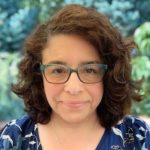
Deciding to become pregnant or discovering that you are pregnant begins a transformative journey. Pregnancy can be a joyous experience that can come with a host of barriers and hurdles. Join us for a conversation this month to discuss pregnancy experiences with women with SCI/D and a researcher who studies pregnancy decision making for women with disabilities. We hope you’ll join us for an amazing conversation about Pregnancy!
SPECIAL GUESTS

Daniela (Dani) Izzie is an advocate and recent filmmaker. She works full time in digital marketing in the wheelchair industry. She holds a Master’s in English Literature with a focus on Disability Studies. As an advocate, her work centers on elevating voices of disabled parents and she is the subject and producer of an upcoming documentary film, “Dani’s Twins,” about pregnancy and motherhood as a quadriplegic during the pandemic. She lives in rural Virginia with her husband, children, and dogs.

Tameka Citchen-Spruce has a strong passion for disability advocacy and media. It started at 21 years old, as Ms. Wheelchair MI 2006. As Ms. Wheelchair MI, she spoke out about supporting women with disabilities who are being abused. Two years later she formed Women Empower Inc, its mission was to empower women with disabilities to live their best lives. Later she studied Broadcast Television and graduated with a bachelor's degree in Journalism from Oakland University. Tameka has been advocating for over 15 years for access to affordable and accessible housing, fighting against voting oppression towards people with disabilities, racial and gender injustices, and health equity. Her short film, Justifiable Homicide, has been nominated and won an award and her My Girl Story documentary has been selected for film festivals. Another important role of Tameka’s life is being a wife and mother of two young children.

Dr. Claire Kalpakjian is a biopsychosocial scientist and clinical and rehabilitation psychologist by training with 30 years of clinical and research experience with diverse populations of persons with disabilities resulting from injury, illness, or by congenital causes. The focus of her program of research is to reduce reproductive health inequity by designing and implementing interventions that address knowledge and practice gaps affecting women with physical disabilities. The ultimate goal of this work is to promote independence, self-advocacy, and healthcare equity.